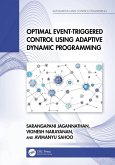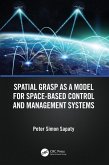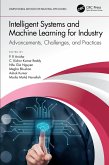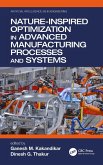Sarangapani Jagannathan, Vignesh Narayanan, Avimanyu Sahoo
Optimal Event-Triggered Control Using Adaptive Dynamic Programming (eBook, PDF)
52,95 €
52,95 €
inkl. MwSt.
Sofort per Download lieferbar

26 °P sammeln
52,95 €
Als Download kaufen

52,95 €
inkl. MwSt.
Sofort per Download lieferbar

26 °P sammeln
Jetzt verschenken
Alle Infos zum eBook verschenken
52,95 €
inkl. MwSt.
Sofort per Download lieferbar
Alle Infos zum eBook verschenken

26 °P sammeln
Sarangapani Jagannathan, Vignesh Narayanan, Avimanyu Sahoo
Optimal Event-Triggered Control Using Adaptive Dynamic Programming (eBook, PDF)
- Format: PDF
- Merkliste
- Auf die Merkliste
- Bewerten Bewerten
- Teilen
- Produkt teilen
- Produkterinnerung
- Produkterinnerung

Bitte loggen Sie sich zunächst in Ihr Kundenkonto ein oder registrieren Sie sich bei
bücher.de, um das eBook-Abo tolino select nutzen zu können.
Hier können Sie sich einloggen
Hier können Sie sich einloggen
Sie sind bereits eingeloggt. Klicken Sie auf 2. tolino select Abo, um fortzufahren.

Bitte loggen Sie sich zunächst in Ihr Kundenkonto ein oder registrieren Sie sich bei bücher.de, um das eBook-Abo tolino select nutzen zu können.
The NCS are a first step to realize cyber-physical systems (CPS) or industry 4.0 vision. The authors apply several powerful modern control techniques to the design of event-triggered controllers and derive event-trigger condition and demonstrate closed-loop stability.
- Geräte: PC
- mit Kopierschutz
- eBook Hilfe
Andere Kunden interessierten sich auch für
![Optimal Event-Triggered Control Using Adaptive Dynamic Programming (eBook, ePUB) Optimal Event-Triggered Control Using Adaptive Dynamic Programming (eBook, ePUB)]() Sarangapani JagannathanOptimal Event-Triggered Control Using Adaptive Dynamic Programming (eBook, ePUB)52,95 €
Sarangapani JagannathanOptimal Event-Triggered Control Using Adaptive Dynamic Programming (eBook, ePUB)52,95 €![Spatial Grasp as a Model for Space-based Control and Management Systems (eBook, PDF) Spatial Grasp as a Model for Space-based Control and Management Systems (eBook, PDF)]() Peter Simon SapatySpatial Grasp as a Model for Space-based Control and Management Systems (eBook, PDF)60,95 €
Peter Simon SapatySpatial Grasp as a Model for Space-based Control and Management Systems (eBook, PDF)60,95 €![Intelligent Systems and Machine Learning for Industry (eBook, PDF) Intelligent Systems and Machine Learning for Industry (eBook, PDF)]() Intelligent Systems and Machine Learning for Industry (eBook, PDF)60,95 €
Intelligent Systems and Machine Learning for Industry (eBook, PDF)60,95 €![Nature-Inspired Optimization in Advanced Manufacturing Processes and Systems (eBook, PDF) Nature-Inspired Optimization in Advanced Manufacturing Processes and Systems (eBook, PDF)]() Nature-Inspired Optimization in Advanced Manufacturing Processes and Systems (eBook, PDF)47,95 €
Nature-Inspired Optimization in Advanced Manufacturing Processes and Systems (eBook, PDF)47,95 €![Ergonomics in the Automotive Design Process (eBook, PDF) Ergonomics in the Automotive Design Process (eBook, PDF)]() Vivek D. BhiseErgonomics in the Automotive Design Process (eBook, PDF)86,95 €
Vivek D. BhiseErgonomics in the Automotive Design Process (eBook, PDF)86,95 €![Ergonomics in the Automotive Design Process (eBook, PDF) Ergonomics in the Automotive Design Process (eBook, PDF)]() Vivek D. BhiseErgonomics in the Automotive Design Process (eBook, PDF)86,95 €
Vivek D. BhiseErgonomics in the Automotive Design Process (eBook, PDF)86,95 €![Green Information and Communication Systems for a Sustainable Future (eBook, PDF) Green Information and Communication Systems for a Sustainable Future (eBook, PDF)]() Green Information and Communication Systems for a Sustainable Future (eBook, PDF)48,95 €
Green Information and Communication Systems for a Sustainable Future (eBook, PDF)48,95 €-
-
-
The NCS are a first step to realize cyber-physical systems (CPS) or industry 4.0 vision. The authors apply several powerful modern control techniques to the design of event-triggered controllers and derive event-trigger condition and demonstrate closed-loop stability.
Dieser Download kann aus rechtlichen Gründen nur mit Rechnungsadresse in A, B, BG, CY, CZ, D, DK, EW, E, FIN, F, GR, HR, H, IRL, I, LT, L, LR, M, NL, PL, P, R, S, SLO, SK ausgeliefert werden.
Produktdetails
- Produktdetails
- Verlag: Taylor & Francis eBooks
- Seitenzahl: 346
- Erscheinungstermin: 21. Juni 2024
- Englisch
- ISBN-13: 9781040049167
- Artikelnr.: 70226723
- Verlag: Taylor & Francis eBooks
- Seitenzahl: 346
- Erscheinungstermin: 21. Juni 2024
- Englisch
- ISBN-13: 9781040049167
- Artikelnr.: 70226723
- Herstellerkennzeichnung Die Herstellerinformationen sind derzeit nicht verfügbar.
Dr. Sarangapani Jagannathan is a Curator's Distinguished Professor and Rutledge-Emerson chair of Electrical and Computer Engineering at the Missouri University of Science and Technology (former University of Missouri-Rolla). He has a joint Professor appointment in the Department of Computer Science. He served as a Director for the NSF Industry/University Cooperative Research Center on Intelligent Maintenance Systems for 13 years. His research interests include learning, adaptation and control, secure human-cyber-physical systems, prognostics, and autonomous systems/robotics. Prior to his Missouri S&T appointment, he served as a faculty at University of Texas at San Antonio and as a staff engineer at Caterpillar, Peoria.
He has coauthored over 500 refereed IEEE Transaction/journal and conference articles, written 18 book chapters, authored/co-edited 6 books, received 21 US patents and one patent defense publication. He delivered around 30 plenary and keynote talks in various international conferences and supervised to graduation 33 doctoral and 31 M.S thesis students. He was a co-editor for the IET book series on control from 2010 until 2013 and served on many editorial boards including IEEE Systems, Man and Cybernetics, and has been on organizing committees of several IEEE Conferences. He is currently an associate editor for IEEE Transactions on Neural Networks and Learning Systems and others.
He received many awards including the 2020 Best Associate Editor Award, 2018 IEEE CSS Transition to Practice Award, 2007 Boeing Pride Achievement Award, 2001 Caterpillar Research Excellence Award, 2021 University of Missouri Presidential Award for sustained career excellence, 2001 University of Texas Presidential Award for early career excellence, and 2000 NSF Career Award. He also received several faculty excellence and teaching excellence and commendation awards. As part of his NSF I/UCRC, he transitioned many technologies and software products to industrial entities saving millions of dollars. He is a Fellow of the IEEE, National Academy of Inventors, and Institute of Measurement and Control, UK, Institution of Engineering and Technology (IET), UK and Asia-Pacific Artificial Intelligence Association.
Dr. Vignesh Narayanan is an Assistant Professor in the AI institute and the Department of Computer Science and Engineering at University of South Carolina (USC), Columbia. He is also affiliated with the Carolina Autism and Neurodevelopment research center at USC. His research interests include dynamical systems and networks, artificial intelligence, data science, learning theory, and computational neuroscience.
He received his B.Tech. Electrical and electronics engineering and M. Tech. Electrical engineering degrees from SASTRA University, Thanjavur, and the National Institute of Technology, Kurukshetra, India, respectively, in 2012 and 2014, and his Ph.D. degree from Missouri University of Science and Technology, Rolla, MO in 2017. He was a post-doctoral research associate at Washington University in St. Louis, before joining the AI institute of USC.
Avimanyu Sahoo received his Ph.D. in Electrical Engineering from Missouri University of Science and Technology, Rolla, MO, USA, in 2015 and a Master of Technology (MTech) from the Indian Institute of Technology (BHU), Varanasi, India, in 2011. He is currently an Assistant Professor in the Electrical and Computer Engineering Department at the University of Alabama in Huntsville (UAH), AL. Before joining UAH, Dr. Sahoo was an Associate Professor in the Division of Engineering Technology at Oklahoma State University, Stillwater, OK.
Dr. Sahoo's research interests include learning-based control and its applications in lithium-ion battery pack modeling, diagnostics, prognostics, cyber-physical systems (CPS), and electric machinery health monitoring. Currently, his research focuses on developing intelligent battery management systems (BMS) for lithium-ion battery packs used onboard electric vehicles, computation, and communication-efficient distributed intelligent control schemes for cyber-physical systems using approximate dynamic programming, reinforcement learning, and distributed adaptive state estimation. He has published over 45 journal and conference articles, including IEEE Transactions on Neural Networks and Learning Systems, Cybernetics, and Industrial Electronics. He is also an Associate Editor in IEEE Transactions on Neural Networks and Learning Systems and Frontiers in Control Engineering: Nonlinear Control.
He has coauthored over 500 refereed IEEE Transaction/journal and conference articles, written 18 book chapters, authored/co-edited 6 books, received 21 US patents and one patent defense publication. He delivered around 30 plenary and keynote talks in various international conferences and supervised to graduation 33 doctoral and 31 M.S thesis students. He was a co-editor for the IET book series on control from 2010 until 2013 and served on many editorial boards including IEEE Systems, Man and Cybernetics, and has been on organizing committees of several IEEE Conferences. He is currently an associate editor for IEEE Transactions on Neural Networks and Learning Systems and others.
He received many awards including the 2020 Best Associate Editor Award, 2018 IEEE CSS Transition to Practice Award, 2007 Boeing Pride Achievement Award, 2001 Caterpillar Research Excellence Award, 2021 University of Missouri Presidential Award for sustained career excellence, 2001 University of Texas Presidential Award for early career excellence, and 2000 NSF Career Award. He also received several faculty excellence and teaching excellence and commendation awards. As part of his NSF I/UCRC, he transitioned many technologies and software products to industrial entities saving millions of dollars. He is a Fellow of the IEEE, National Academy of Inventors, and Institute of Measurement and Control, UK, Institution of Engineering and Technology (IET), UK and Asia-Pacific Artificial Intelligence Association.
Dr. Vignesh Narayanan is an Assistant Professor in the AI institute and the Department of Computer Science and Engineering at University of South Carolina (USC), Columbia. He is also affiliated with the Carolina Autism and Neurodevelopment research center at USC. His research interests include dynamical systems and networks, artificial intelligence, data science, learning theory, and computational neuroscience.
He received his B.Tech. Electrical and electronics engineering and M. Tech. Electrical engineering degrees from SASTRA University, Thanjavur, and the National Institute of Technology, Kurukshetra, India, respectively, in 2012 and 2014, and his Ph.D. degree from Missouri University of Science and Technology, Rolla, MO in 2017. He was a post-doctoral research associate at Washington University in St. Louis, before joining the AI institute of USC.
Avimanyu Sahoo received his Ph.D. in Electrical Engineering from Missouri University of Science and Technology, Rolla, MO, USA, in 2015 and a Master of Technology (MTech) from the Indian Institute of Technology (BHU), Varanasi, India, in 2011. He is currently an Assistant Professor in the Electrical and Computer Engineering Department at the University of Alabama in Huntsville (UAH), AL. Before joining UAH, Dr. Sahoo was an Associate Professor in the Division of Engineering Technology at Oklahoma State University, Stillwater, OK.
Dr. Sahoo's research interests include learning-based control and its applications in lithium-ion battery pack modeling, diagnostics, prognostics, cyber-physical systems (CPS), and electric machinery health monitoring. Currently, his research focuses on developing intelligent battery management systems (BMS) for lithium-ion battery packs used onboard electric vehicles, computation, and communication-efficient distributed intelligent control schemes for cyber-physical systems using approximate dynamic programming, reinforcement learning, and distributed adaptive state estimation. He has published over 45 journal and conference articles, including IEEE Transactions on Neural Networks and Learning Systems, Cybernetics, and Industrial Electronics. He is also an Associate Editor in IEEE Transactions on Neural Networks and Learning Systems and Frontiers in Control Engineering: Nonlinear Control.
1. Background and Introduction to Event-triggered Control 2. Adaptive Dynamic Programming and Optimal Control 3 Linear Discrete-time and Networked Control Systems 4. Nonlinear Continuous-time Systems 5. Co-optimization of Event-triggered Sampling and Control 6. Large-scale Linear Interconnected Systems 7. Large-scale Nonlinear Interconnected Systems 8. Exploration and Hybrid Learning for Nonlinear Interconnected Systems 9. Event-Triggered Control Applications
1. Background and Introduction to Event-triggered Control 2. Adaptive Dynamic Programming and Optimal Control 3 Linear Discrete-time and Networked Control Systems 4. Nonlinear Continuous-time Systems 5. Co-optimization of Event-triggered Sampling and Control 6. Large-scale Linear Interconnected Systems 7. Large-scale Nonlinear Interconnected Systems 8. Exploration and Hybrid Learning for Nonlinear Interconnected Systems 9. Event-Triggered Control Applications







